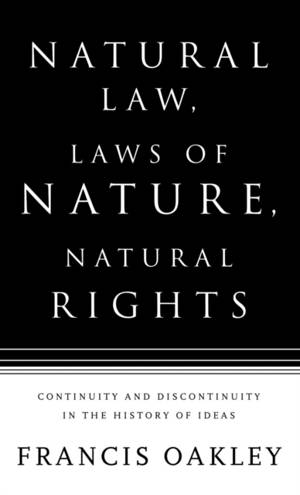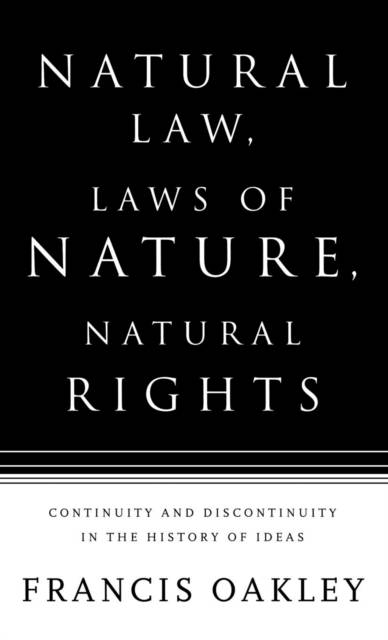
Vous voulez être sûr que vos cadeaux seront sous le sapin de Noël à temps? Nos magasins vous accueillent à bras ouverts. La plupart de nos magasins sont ouverts également les dimanches, vous pouvez vérifier les heures d'ouvertures sur notre site.
- Retrait gratuit dans votre magasin Club
- 7.000.000 titres dans notre catalogue
- Payer en toute sécurité
- Toujours un magasin près de chez vous
Vous voulez être sûr que vos cadeaux seront sous le sapin de Noël à temps? Nos magasins vous accueillent à bras ouverts. La plupart de nos magasins sont ouverts également les dimanches, vous pouvez vérifier les heures d'ouvertures sur notre site.
- Retrait gratuit dans votre magasin Club
- 7.000.0000 titres dans notre catalogue
- Payer en toute sécurité
- Toujours un magasin près de chez vous
Natural Law, Laws of Nature, Natural Rights
Continuity and Discontinuity in the History of Ideas
Francis Oakley
Livre relié | Anglais
121,45 €
+ 242 points
Description
Choice Outstanding Academic Title 2006
The existence and grounding of human or natural rights is a heavily contested issue today, not only in the West but in the debates raging between "fundamentalists" and "liberals" or "modernists in the Islamic world. So, too, are the revised versions of natural law espoused by thinkers such as John Finnis and Robert George. This book focuses on three bodies of theory that developed between the thirteenth and seventeenth centuries: (1) the foundational belief in the existence of a moral/juridical natural law, embodying universal norms of right and wrong and accessible to natural human reason; (2) the understanding of (scientific) uniformities of nature as divinely imposed laws, which rose to prominence in the seventeenth century; and (3), finally, the notion that individuals are bearers of inalienable natural or human rights. While seen today as distinct bodies of theory often locked in mutual conflict, they grew up inextricably intertwines. The book argues that they cannot be properly understood if taken each in isolation from the others.Choice Outstanding Academic Title 2006 The existence and grounding of human or natural rights is a heavily contested issue today, not only in the West but in the debates raging between "fundamentalists" and "liberals" or "modernists in the Islamic world. So, too, are the revised versions of natural law espoused by thinkers such as John Finnis and Robert George. This book focuses on three bodies of theory that developed between the thirteenth and seventeenth centuries: (1) the foundational belief in the existence of a moral/juridical natural law, embodying universal norms of right and wrong and accessible to natural human reason; (2) the understanding of (scientific) uniformities of nature as divinely imposed laws, which rose to prominence in the seventeenth century; and (3), finally, the notion that individuals are bearers of inalienable natural or human rights. While seen today as distinct bodies of theory often locked in mutual conflict, they grew up inextricably intertwines. The book argues that they cannot be properly understood if taken each in isolation from the others.
Spécifications
Parties prenantes
- Auteur(s) :
- Editeur:
Contenu
- Nombre de pages :
- 144
- Langue:
- Anglais
Caractéristiques
- EAN:
- 9780826417657
- Date de parution :
- 22-09-05
- Format:
- Livre relié
- Format numérique:
- Genaaid
- Dimensions :
- 142 mm x 227 mm
- Poids :
- 312 g







